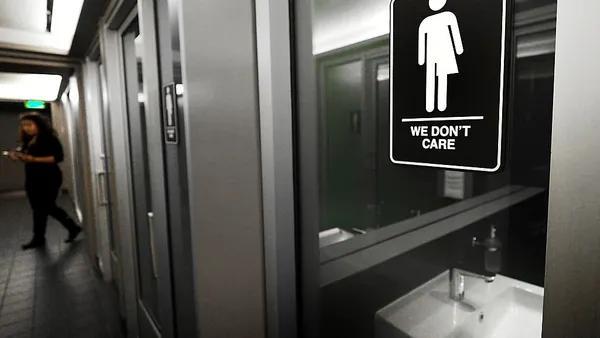Dive Brief:
- Dick's Sporting Goods has agreed to pay $2.9 million to a class of 10,700 current and former California employees to settle a suit alleging they were due pay for time spent in security checks (Greer, et al. v. Dick's Sporting Goods, Inc., No. 15-cv-01063 (E.D. Calif. Mar. 26, 2019)).
- California Dick's stores searched employees and their bags at the end of shifts without paying for this time between March 2011 and January 2015, when the stores "installed time punch terminals at store exits and started paying for this time," the plaintiffs alleged. The workers also alleged Dick's failed to reimburse employees for work-related clothing expenses, provided noncompliant wage statements and willfully failed to pay wages on a timely basis upon employment termination.
- Each plaintiff stands to receive approximately $155 from the settlement.
Dive Insight:
The Fair Labor Standards Act (FLSA) doesn't provide a hard line on compensation for "preliminary" or "postliminary" work activities. "Time spent in activities which are preliminary (before you begin your principal work activities) and postliminary (after you end your principal work activities) may or may not be hours worked," according to the U.S. Department of Labor.
The U.S. Supreme Court provided some clarification in a 2014 ruling on a case in which warehouse workers claimed that they should be paid for the roughly 25 minutes they spent each day in security screenings before leaving work. Only "principal activities" are compensable, said the Court, meaning those which are an "integral and indispensable" part of an employee's duties. The security screenings, on the other hand, were "noncompensable postliminary activities."
Why the different result here, in Greer? California law defines "hours worked" as "the time during which an employee is subject to the control of an employer, and includes all the time the employee is suffered or permitted to work, whether or not required to do so," the court said. Therefore, "an employee who is subject to an employer's control does not have to be working during that time to be compensated."
In general, de minimis amounts of time need not be compensated. This can be a high, but not impossible, bar for employers to meet. In 2017, a federal trial court in California granted summary judgment to shoe manufacturer Converse in a class action lawsuit dealing with mandatory bag checks. While the plaintiffs claimed the bag checks sometimes took more than two minutes, Converse was able to show that the bag inspections generally took less than 10 seconds. (California has since revisited the de minimis doctrine at the state level in a case that could have serious implications for Golden State employers.)
The bottom line is that employers in California and elsewhere should exercise caution when requiring nonexempt employees to engage in mandatory unpaid work-related activities.














